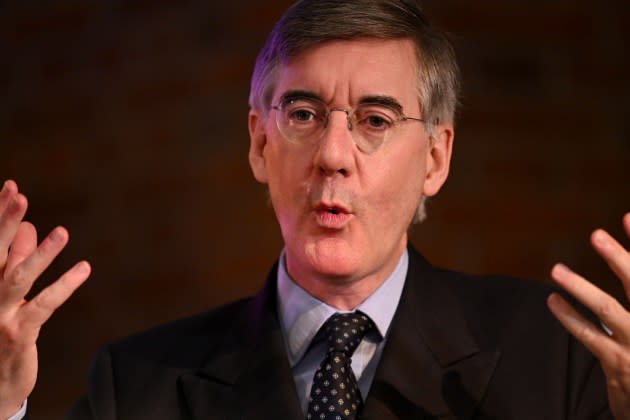U.K. Media Regulator Unveils “Strengthened” Guidance on Programs Presented by Politicians

U.K. media regulator Ofcom published “strengthened” industry guidance and issued a warning to broadcasters on Wednesday after recently finding that news network GB News, which is often described as the British equivalent of the Fox News Channel, had breached regulations around politicians moonlighting as TV news presenters.
“Following a series of decisions about programs presented by politicians found in breach of Rules 5.1 and 5.3 of (the Ofcom Broadcasting Code) – a number of important learnings for broadcasters have been hardwired into strengthened industry guidance,” it said.
More from The Hollywood Reporter
Cate Blanchett, Colin Farrell and Millie Bobby Brown in Cannes Immersive Lineup
Karlovy Vary Festival Piles on Angsty Adaptations With Franz Kafka Retrospective
Cannes Adds Michel Hazanavicius, Mohammad Rasoulof, Emanuel Parvu Titles to Official Competition
Rule 5.1 says that “news, in whatever form, must be reported with due accuracy and presented with due impartiality.” Rule 5.3 states: “5.3: No politician may be used as a newsreader, interviewer or reporter in any news programs unless, exceptionally, it is editorially justified. In that case, the political allegiance of that person must be made clear to the audience.”
The updated guidance “reminds broadcasters that, because politicians have an inherently partial role in society, news content presented by them is likely to be viewed by audiences in light of that perceived bias, which would risk undermining the integrity and credibility of broadcast news,” Ofcom explained. “The guidance also makes clear that broadcasters retain editorial freedom to create programs which move between news and current affairs content. But it cautions that if a broadcaster chooses to use a politician as the host of such a program, they must ensure they do not act as a newsreader, news interviewer or news reporter at any point in that program.”
In mid-March, Ofcom ruled that episodes of GB News news shows Jacob Rees-Mogg’s State of the Nation, Friday Morning with Esther and Phil, and Saturday Morning with Esther and Phil had breached its impartiality rules. Rees-Mog and the husband and wife duo of Esther McVey and Philip Davies are serving members of parliament in the U.K.
Ofcom’s rules call for “due” impartiality, explaining that this means impartiality that is “adequate or appropriate to the subject and nature of the program.” Explains its code: “So ‘due impartiality’ does not mean an equal division of time has to be given to every view, or that every argument and every facet of every argument has to be represented.”
With a general election due in the U.K. before Jan. 25, 2025, Ofcom put U.K. broadcasters on notice on Wednesday. “We are also sounding a warning to broadcasters to maintain the highest level of due impartiality, in line with our enhanced rules that apply during election periods,” it said. “Any breaches of election programming rules are likely to be serious and to result in Ofcom considering the imposition of statutory sanctions.”
The regulator particularly reminded the industry of rule 6.6 of its code, which “prohibits candidates in U.K. elections from acting as news presenters, interviewers or presenters of any type of program during the election period.” But Ofcom also emphasized: “Politicians who are not standing as candidates in a U.K. election can present non-news programs – including current affairs – during election periods, provided that program complies with all relevant code rules.”
Ofcom sanctions range from fines and directions not to repeat content or to air a correction or statement on Ofcom’s findings to shortening, suspending or even revoking a broadcast license.
Ofcom on Wednesday also presented research on politicians hosting TV and radio shows that found that the U.K. audience “broadly supports existing ‘due impartiality’ rules.”
People also expressed “a range of views about politicians presenting current affairs programs, but although there were concerns, there’s no clear consensus for an outright ban,” Ofcom also highlighted. “Opinions on this issue are mixed; some groups were uncomfortable with it, some were less concerned, while others were supportive. Audiences also recognize this editorial format offers both advantages and disadvantages. For example, there are concerns that politicians could promote an agenda or mislead audiences who might not recognize them as a politician. On the other hand, people consider this practice provides a platform for greater accountability to the public. Participants also balanced concerns about a potential lack of due impartiality against the importance of freedom of expression.”
The U.K. government of Conservative Party leader Rishi Sunak earlier this year unveiled a 40 percent corporate tax relief for film and TV studio facilities until 2034, introduced a new independent film incentive of 40 percent, and announced an increase to an existing incentive for visual effects. The moves earned praise from entertainment industry leaders.
Best of The Hollywood Reporter
A 'Star Wars' Timeline: All the Movies and TV Shows in the Franchise
'Star Wars': 16 Animated Characters Who Made the Leap to Live-Action
Power Showrunners: Hollywood’s 50-ish Most Influential Writer-Producers of 2023

